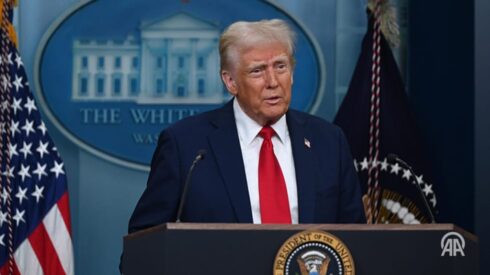President Donald Trump has announced a sweeping 25% tariff on imported cars and auto parts, a move he claims will revitalize the U.S. automobile industry and boost domestic manufacturing. The tariffs, set to take effect on April 3, 2025, apply to all foreign-made passenger vehicles, including sedans, SUVs, minivans, and trucks. Auto parts, such as engines, transmissions, and electronic systems, will also be affected, though temporary exemptions have been granted to parts imported from Canada and Mexico.
Speaking at a press conference, Trump defended the tariffs as a necessary step to protect American workers and businesses. “If you build your car in the United States, there is no tariff,” he stated, emphasizing his administration’s commitment to reshoring auto production. The president Trump argued that the policy would lead to “tremendous growth” in domestic car manufacturing and create thousands of jobs.
However, analysts warn that the move could have unintended consequences, including price hikes for consumers, retaliatory tariffs from trade partners, and disruptions to global supply chains. The tariffs revive a long-standing debate about trade protectionism, with supporters hailing the measure as a win for American workers while critics warn of economic fallout.
Economic and Industry Impact: Higher Prices and Job Uncertainty
The new tariffs are expected to drive up the cost of vehicles in the U.S., with experts estimating price increases of $4,000 to $12,500 per car, depending on the model and country of origin. The Anderson Economic Group projects that American consumers will bear the brunt of these additional costs, making new cars less affordable, particularly for middle- and lower-income buyers.
Additionally, the move threatens to disrupt operations for automakers with global supply chains. Many U.S. car manufacturers, including General Motors, Ford, and Tesla, rely on imported parts to assemble their vehicles domestically. Higher costs on these parts could force companies to pass on expenses to consumers or cut production, potentially leading to job losses rather than the economic boom Trump envisions.
Financial markets reacted negatively to the announcement, with shares of major automakers—including General Motors, Ford, Toyota, and Honda—falling by 3-5% on Wall Street. Analysts fear that the policy will lead to decreased investment in the auto sector and create uncertainty for car manufacturers navigating an already volatile market.
International Response: Allies Condemn ‘Trade War’ Tactics
The announcement by President Trump has triggered sharp criticism from U.S. trade partners, many of whom view the tariffs as a direct attack on their industries. Canadian Prime Minister Mark Carney called the decision a “direct assault on Canadian autoworkers,” vowing to take measures to protect his country’s economic interests. “This will hurt us, but through this period, by standing together, we will emerge stronger,” Carney said in a statement.
European Commission President Ursula von der Leyen also condemned the move, stating, “Tariffs are taxes—bad for businesses, worse for consumers. The European Union will consider all options to safeguard its economic interests.” The EU is a major exporter of cars to the U.S., with German automakers such as BMW, Mercedes-Benz, and Volkswagen among the most affected.
Japan, home to auto giants like Toyota, Nissan, and Honda, has hinted at possible retaliatory measures. Japanese Prime Minister Shigeru Ishiba said his government would “explore all options” in response to the tariffs. The Japanese auto industry is a key player in the global market, and analysts warn that an escalating trade war could have widespread economic consequences.
Legal and Trade Policy Ramifications of President Trump news tariffs increments
Trump’s tariffs are based on a controversial interpretation of the 1962 Trade Expansion Act, which allows the president to impose trade restrictions on national security grounds. A similar probe in 2019, conducted during Trump’s first term, concluded that auto imports posed a potential risk to U.S. national security, but no action was taken at the time. Now, the administration is reviving this justification, claiming that excessive reliance on foreign-made vehicles threatens the stability of the U.S. economy.
Critics argue that the move violates existing trade agreements, particularly the United States-Mexico-Canada Agreement (USMCA). While USMCA-compliant auto parts are temporarily exempt, experts question whether the tariffs undermine the spirit of free trade agreements. Legal challenges from affected countries and automakers are expected in the coming months.
Meanwhile, the Biden administration, along with Democratic lawmakers, has expressed concern over the potential economic harm of the tariffs. Senate Majority Leader Chuck Schumer called for congressional oversight, warning that “Trump’s trade policies risk harming American families and businesses while alienating key allies.”
What’s Next for the Auto Industry and Consumers?
With the new tariffs by Trump administration set to take effect in less than a week, automakers, consumers, and policymakers are bracing for the impact. Some companies, like Hyundai, have responded by pledging to expand their U.S. operations, with the South Korean automaker recently announcing a $21 billion investment in American manufacturing, including a new steel plant in Louisiana. Trump hailed this investment as proof that his policies are working.
However, the broader auto industry remains uncertain about the future. Many manufacturers may be forced to rethink their supply chains, negotiate tariff exemptions, or pass costs onto consumers. Experts predict a decline in car sales, especially for foreign brands, as prices rise and affordability declines.
Consumers, too, will have to adjust to a new reality of higher vehicle costs. For those looking to purchase a new car, industry analysts suggest acting before the tariffs take effect or considering domestic brands to avoid additional fees.
As global leaders weigh potential retaliatory actions and legal challenges mount, Trump’s latest trade move signals a return to aggressive economic nationalism. Whether it delivers on his promises of growth and job creation or sparks a prolonged trade dispute remains to be seen
Trump’s 25% tariff on car imports is a bold and controversial policy shift with far-reaching implications. While the administration sees it as a strategy to bolster American manufacturing, critics warn it could backfire, leading to higher consumer prices, strained international relations, and disruptions in the global auto industry. As the April 3 deadline approaches, the world will be watching closely to see how this latest trade escalation unfolds.














